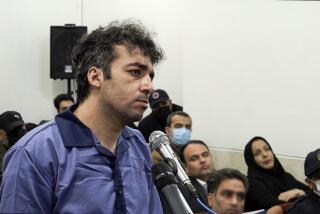Egypt Acquits 24 Accused of Assassination
- Share via
CAIRO — A court acquitted 24 Muslim extremists Saturday of assassinating Egypt’s Parliament Speaker and lambasted prosecutors for building their case on confessions drawn by torture.
Ten of the defendants were convicted on lesser charges and sentenced to prison for up to 15 years. But the sentences were in stark contrast to those handed down by Egypt’s special military-run security courts, which have condemned 21 militants to death in the last six months.
The civilian court’s statement was unusually blunt in a country whose government has clamped down on extremists seeking to topple the secular leadership and install an Islamic government.
Afterward, defense lawyers said the verdict sets a challenge for military courts trying similar cases. President Hosni Mubarak has turned to military courts over the last year to prosecute extremists swiftly.
Chief Judge Wahid Mahmoud Ibrahim noted that none of the government’s 100 prosecution witnesses were able to identify any of the suspects in the Oct. 12, 1990, killing of Parliament Speaker Rifaat Mahgoub.
In addition, Ibrahim cited medical reports that the suspects were subject to the “ugliest forms of torture,” including electric shock, hanging by the arms, blindfolding and handcuffing.
The case was tried by an emergency state security court, which allows no appeal. Its verdicts must be approved by Mubarak, and some retrials are permitted.
Human rights organizations and Western governments, including the United States, contend that Egyptian authorities often use torture as an investigation tool, especially against accused Islamic extremists.
But while many defendants complain of torture, judges seldom criticize authorities for using it or cite its use as a consideration in acquittals.
Rights advocates have criticized military judges for issuing large numbers of death sentences after brief trials.
As Saturday’s verdict was read, the 16 defendants in custody--most bearded and dressed in white robes--began chanting religious slogans from their courtroom cage.
Their mothers, wives and sisters let out high-pitched trills of joy from behind black veils. Defense lawyers kissed and hugged each other.
More to Read
Sign up for Essential California
The most important California stories and recommendations in your inbox every morning.
You may occasionally receive promotional content from the Los Angeles Times.













